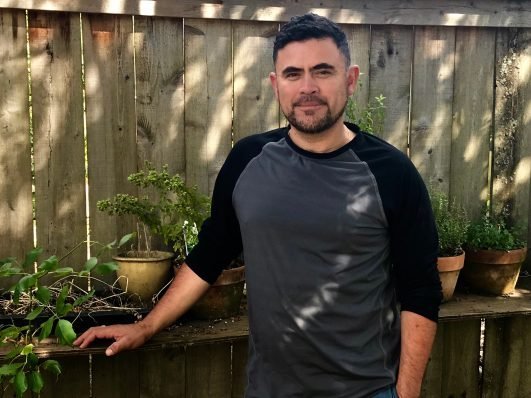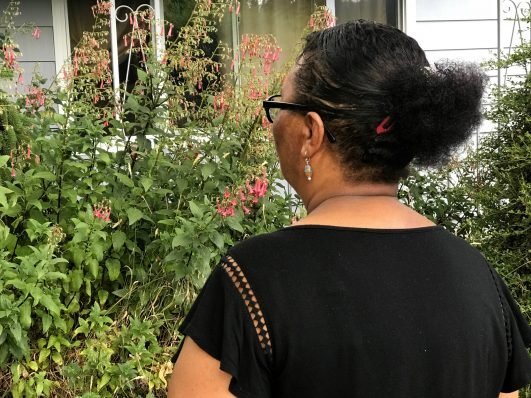
OREGON
Bernal
PORTLAND, OR
“I think across the board when a family relocates, there are roles that are reversed and, you know, people didn’t anticipate certain changes… But you know my Mom in Guatemala was an actress. She was a live theater actress. She was in over 300 plays… My Dad was a man of influence… When you come to the States and you don’t speak the language and there is no theater for Spanish speakers, and my Dad didn’t have skills that translated into another job – what happened is my Mom got a job assembling furniture! So she literally made couches, and my Dad couldn’t get a job.”

So I am originally from Guatemala. I grew up in Guatemala City, and I moved to the United States in 1990. That makes it 28 years, yeah.
So we had a long lay over, but then we flew directly to Portland, via Seattle actually. I vividly remember coming in late at night and seeing my grandparents. They lived in a small house in Southeast Portland, and they had rearranged the downstairs for us kids. So my younger brother and I shared a room. My older brother had his own room. Our rooms had these two little beds, and each bed had a stuffed penguin on it that my Grandfather had got for us. Yeah, so that’s a pretty vivid memory that I have.
I think across the board when a family relocates, there are roles that are reversed and, you know, people didn’t anticipate certain changes… I am a crier. I have said that before – the only thing is that I just want to be able to get the words out. I have no problem talking about this despite my tears. But you know my Mom in Guatemala was an actress. She was a live theater actress. She was in over 300 plays, and it was really unusual but my peers would say instead of, “Let’s got hangout at the mall!” Or, “Let’s go hangout at the movies!” They would say, “Can your mom get us in the theater?” And I would ask my Mom, and she’d say, “It’s not really an appropriate play for kids.” And I don’t know other people who have had this experience, I mean – Oh, let us go in the theater! And so she was a woman of culture and she loved the theater. The university that she graduated from it’s called the Popular University. It’s a very deliberate name – it’s like for the people. It’s sort of a community-based effort, you know, and the plays were written by Guatemalan playwrights and they were about Guatemalan issues. And it was very cool! My birthdays were the best, you know. The clowns that were her friends would come to my birthday parties and that sort of thing.
My Dad was a man of influence, and he knew how to do basically very few things but he did them well, and one of them was he was a boss. When you come to the States and you don’t speak the language and there is no theater for Spanish speakers, and my Dad didn’t have skills that translated into another job – what happened is my Mom got a job assembling furniture! So she literally made couches, and my Dad couldn’t get a job. I mean, I don’t really know that he tried. I know he’s not a lazy person, you know, but I just felt that he was so paralyzed by his perceived inability to really do anything, and his language skills were not great… So all he could do was take the little bit of money that he had and invest it, and he did really well, actually, in that regard. Initially, right.
And this is the part that makes me really sad is, my younger brother – he didn’t cry like I do – but he was very upset that Mom wasn’t home. He was not having it. That was not okay. That was that transition that made us all very sad for her. You know it’s like, “You’ve never had to do this before. You have never had to look at your hands and check out the skin that’s been peeling off because you have been stuffing, you know, cushions and things like that. Or getting up so early and coming home and being so exhausted.”
She went through a period of being very fearful that we would experience irreversible or incapacitating food insecurity. And so she would buy flour tortillas – which were new to us, no such thing in Guatemala at the time, right? Hotdogs – which we were all about, because what a treat! And bags of cheddar cheese – which was also unlike cheese we had in Guatemala. So it was all kind of new. And we did – we melted cheese and put hot dogs in the microwave and ate that. And nobody thought we were suffering. Nobody thought, “Oh my Gosh, I wish we had like better food!” We thought, “This is awesome!” And in her own mind, she was just so glad that she could keep us sort of satisfied with such cheap items. It wasn’t until later that I realized that she was doing this because she wasn’t sure whether we were going to be able to afford the things that we needed. As much as I feel like I have lived a life of privilege in Guatemala, it was by no means extravagant. The doctrine in my family has a lot to do with allocation of funds and, you know, not wasting – is really what I am trying to say. So we have always been really conscious of that, and my Mom really worried that we would go without. And in retrospect, I remember thinking that must have been really hard because there were so many hot dogs in the house! Yeah.
I think that living in the US has allowed me to evolve a perspective that is framed in love and inclusion. And I see my friends and age mates and peers from Guatemala not being able to or willing to entertain practicing that. Very specifically I think there’s a lot of cultural values that are conducive to things like isms and phobias, you know. So certainly homophobia is huge, you know. And I still get memes and text messages from groups that I belong to from my peers in Guatemala that I have to delete immediately. You know, I don’t want these hateful messages on my phone – which are jokes. Jokes about Ricky Martin and his homosexuality, for example. And you know, I am just appalled. I know some of the friends that were in the group are gay and they are not out, and there is good reason why they are not out. So being in the U.S. it seems sort of like, at least in the culture that I have submerged myself in, has always been conducive to acceptance of everything. You know, I will use sexuality as an example – but really truly of everything! I live in an environment where I can cultivate these ideas, and sort of dare I say it, elevate myself consciously a little more. So than if I was living in a place where the cultural norms would prevent you from being able to interrupt or speak up when you see something that is not right – because it is very, very hard in a place like Guatemala.
So I work directly with unaccompanied children who are in the custody of the Federal government. I can best describe my job as somebody who can advocate for their needs – make sure their needs are being met. And I also can inform people who are in positions of making decisions about where the kids are going to go. I make recommendations based on my knowledge of the cases. So there is a lot of conflict and there is a lot of sort of cultural negotiation and political negotiation that has to happen, but yeah. I mean it is no coincidence that this is my job, you know what I mean. And when I do meet these children, it’s a pretty great experience I think for the most part. I mean, we have a lot of kids from Guatemala. We have a lot of kids from a certain part of Guatemala. It is called the (Northern) Triangle, and I have been there, and I can talk to them, and I can show them pictures of when I was there – of the park and the food that I ate. And immediately there is this bond, and they kind of open up. And I never make false promises, and in fact I say that. I say, “You know, I can’t really talk to you about the specifics of your case, because then if this doesn’t happen in a certain number of days, then the only liar will be me. But you can ask your staff to call me, and I will be here within 24 hours.” So I like to think I offer them hope. I like to think that on some level they feel like people are being held accountable. That things haven’t been put away and shuffled somewhere and forgotten about. Although that is the case sometimes for some cases, and mostly for adult cases.
I had the great privilege of being on a panel discussion with the chair of the Republican Party for the State of Oregon. So he was here. There was a comedian, of all people, in the middle and then me. And we got to answer a question initially. And they said, “What is the biggest problem facing the whole issue of migration currently?” And we both agreed that it is the narrative. Ironically, I think that a lot of people folks who are supporting the current administration are afraid that things are going to change too much. That’s really what they identify with. I saw somebody, a long time ago, on one of the new channels saying, “Sincerely, what I am afraid of is that without this president things will never be what they have been!” And while I agree that maybe this isn’t the 50s – and may it will never be again – there are some fundamental things about this country that really shouldn’t change. And on that level, we totally agree. And one of those things is that this country has been everyone’s country, right? And the concept that, you know, borders exist because humans are unable to overcome their egos is another thing that we would probably end up agreeing upon, right? And that we should all be proud to be part of this country that can still open its arms and welcome people when they need it instead of policing the world, because that hasn’t worked out very well.
BIZUNESH
PORTLAND, OR
“Yes it really very hard to raise children in America, especially refugee. Parents are refugee, children – as we know some of the children not respecting parents – but we really teach them a lot, we are teaching them in the house because we have a responsible for our children. There are a lot of family members who came from our country and losing our children.”

I’m originally from East Africa, Ethiopia. I have been here more than fifteen years now – thank god we are here!
When we arrived at airport here in Portland, we – the first time we just worried around, look around until we got somebody to come and take care of us. But we just arrived late and but our sponsors already – her name is Ellis Abbot – she’s waiting for us in the airport and she show us my husband’s name and we just run to each other anyways. And we are so happy and – happy and loving and in tear, anyways we didn’t believe it that we are in America.
My son is five years old when the first time when we came here, and my daughter is three years. It’s really very hard time anyways, but we are happy to get this chance to came to America and to live with a new life with people. The good part of US culture is that if something happen there is 911. If something happen to you, you have your cell phone. If you don’t have your cell phone you need to shout. Something (would) be for you over there – so I like, I like the security.
Yes it really very hard to raise children in America, especially refugee. Parents are refugee, children – as we know some of the children not respecting parents – but we really teach them a lot, we are teaching them in the house because we have a responsible for our children. There are a lot of family members who came from our country and losing our children. They have childrens here, because they involve in something, no education if they are involving in something, they are losing their education – no life. So they need to be aware that, they need to teach them in a soft voice and being a good example for their children’s life. They are answerable for their children. We brought them this all far from far away, from far place to live a good life. And we teach them to respect us, to get their goals in a good way, instead of involving and losing their education. And we just open everything and – they need to learn from us! We are, we need to be a good example for our children. So if we are not a good people they’re not good. They’re gonna – we’re gonna lose them, and they’re gonna lose us. So we just make it balance everything and talk to them and make them comfort and happy.
I work like for seven years as housekeeping in the Hotel Lucia, and after that my kids are grown up and they are doing great job and I took two years childcare management online and I got my diploma. After I got my diploma, I apply at Francis Montessori School as a teachers, assistant teacher. After I work there for two years, just getting experience, and I apply for health centre, and I’m taking care of elders.
I’m so happy when I go back and looking around what’s happening before in that dark life in refugee camp, and when I’m thinking about that… And when I’m complaining, comparing that old life, right now in United States – it’s really, I’m proud of myself. As a woman, and as a refugee woman, I’m so proud of myself. I never give up on problem. I never give up.
